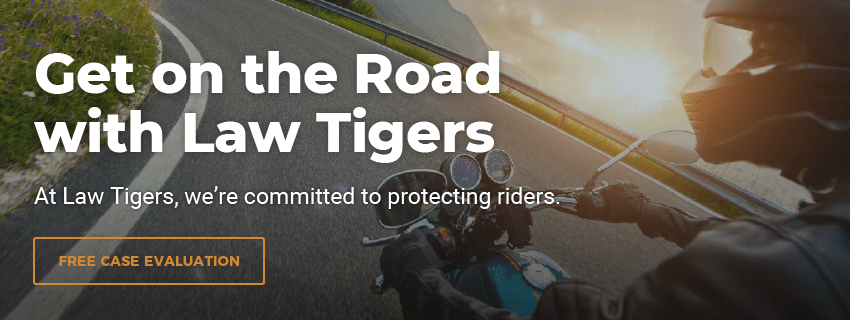What to Do When You’re in a Motorcycle Accident

Even though motorcycles make up only 3% of all registered vehicles in the United States, they account for approximately 14% of crash fatalities. Motorcyclists tend to be more exposed on the road than four-wheeled vehicles, and the majority of accidents are caused by cars colliding with the bike.
It can feel like an impossible challenge to think clearly and act rationally in the aftermath of a crash. This checklist will outline the steps you should take immediately after an accident. We’ve also included helpful tips on activities you should avoid.
Steps to Take After a Motorcycle Accident
The steps below are mostly in order of what you should do after a motorcycle accident to protect your health as well as your ability to be compensated for your injuries.
Get to a Safe Area
Your immediate safety and the safety of any others involved in the accident is the absolute top priority. After a collision, make sure you are off the roadway and away from any oncoming traffic. If you are severely injured and unable to move, you may have to wait until paramedics arrive to relocate you safely.
Remove Your Motorcycle from the Road If You Can Do So Safely
Again, safety is important here. If you can safely remove your motorcycle from the roadway, do so. However, if moving your bike puts you in further danger, it’s recommended that you leave it and allow the authorities to transfer your wheels.
Continue Wearing Your Protective Gear
Your first instinct may be to remove your helmet, gloves, and other protective items to examine your injuries and take pressure off painful parts of your body. Instead, resist the urge to remove these items until the paramedics arrive and assess your injuries. You could inadvertently cause greater injuries by taking off your gear.
Call the Police
Once you’re in a safe area off the roadway, dial 911. It’s possible another person has already called, especially if you were injured at the scene. Regardless of whether someone else may have called it’s always a good idea to cover your bases and dial the police.
Gather Evidence
There will be plenty of evidence at the scene that authorities and insurance companies will use to determine who was at fault for the accident. Any evidence that you can also gather may supplement the information obtained by the authorities.
Types of helpful evidence to collect includes:
– Pictures of your motorcycle and the other vehicle(s)
– Pictures of the other vehicle’s license plate and the motorist’s driver’s license
– Any skid marks on the roadway
– Signs indicating speed, road conditions, etc.
– Statements from people who witnessed the accident
You can also obtain a copy of the police report. Depending on where you live, you may be able to order the police report online for a small fee. You may also visit the local police station to request a copy.
We also recommend taking notes about what happened, being as detailed as possible. As time passes, your memory may shift, and details could potentially fade. By documenting the incident immediately after it happened, you can preserve the evidence.
You don’t necessarily need a notebook for this activity. If your smartphone is still operational after the crash, you can record a voice memo where you describe the incident in as much detail as possible.

Exchange Information from the Other Parties
Though you want to avoid blaming the other party or admitting to any fault, you should still get their contact information. It’s also smart to get the names and phone numbers of any witnesses.
In some cases, the other driver may flee the scene if they had been drinking, have a long list of traffic violations, or have an invalid license. If you get the person’s contact information before they attempt to flee (taking a picture of their driver’s license is better than simply taking their word for it), you and the authorities will have a better chance of tracking the person down.
Seek Medical Attention
We cannot emphasize enough the importance of seeing a doctor immediately after your accident. Delaying medical attention can compromise your injury claim.compromise both your health and even affect your injury claim.
For example, let’s say that you avoid seeking medical attention because nothing immediately “hurts.” But then, a few days or weeks later, you notice that you feel incredibly stiff. When you visit the doctor, you are diagnosed with a severe spinal injury.
Unfortunately, the delay can cause the other driver’s insurance company to argue that the injury you sought treatment for was not related to the accident. Alternatively, the insurance company could argue that you are exaggerating your claims to get a bigger settlement.
The moral of the story is that even if you think your injuries are minor, you should still get checked out by a doctor.
Contact Your Insurance Company
Some states operate differently when handling insurance claims, but in general, you will always want to contact your own insurance company to notify them of what happened. Depending on the state in which you reside, your insurance company may handle the entire claim or seek damages from the other insurance company.
Regardless of who ultimately handles the claim, you must notify your insurance provider of any accident to initiate the claims process.
Speak with an Attorney
In any accident that involves an injury, a personal injury attorney can help you settle a claim by representing your interests and negotiating with the insurance company. It’s not unusual for insurance companies to try to “trip up” accident victims by getting them to admit something that harms their case and jeopardizes their ability to receive fair compensation.
Though an attorney cannot guarantee a favorable outcome or a specific payout, you can rely on an attorney to see you through the process and handle the intricacies of an insurance claim.
Maintain Detailed Records
Throughout the process, keeping records of your medical bills, pay stubs, and injury-related expenditures can help streamline your claim. The reason is that if you are seeking a specific settlement offer, you’ll need to be able to prove that it is warranted. You can do this by showing how much you have had to pay to recover from the accident and resume your regular lifestyle.
It can also be helpful to keep a journal documenting your pain levels, emotional state, and other information pertaining to your recovery.
What Not to Do
While there’s a long list of things you should do when you are in a motorcycle accident, there are also a few things you should avoid doing.
Refrain from Speaking with Others
It’s natural to want to share your experience with friends and loved ones, but you should resist sharing details of the accident with anyone except your attorney. The other driver’s insurance company may interview people who are close to you, looking for any loophole that could compromise your claim.
Avoid Posting on Social Media
Whether you’re feeling great or terrible after your accident, avoid sharing anything on social media without first speaking with your attorney. Even an innocent post about your recovery could potentially be misconstrued or manipulated.
Do Not Accept a Settlement Offer Too Quickly
Keep in mind that insurance companies are in the business of making money. As a result, you can invariably expect them to offer you as little money as possible.
The insurance company may want to get you “off their back,” or they might hope that your financial situation is desperate enough to cause you to accept anything to cover your accumulating medical bills. Before accepting an offer from an insurance company, speak with a personal injury attorney to discuss whether the offer is adequate.
Law Tigers Helps You Get Back on the Road
In an ideal world, truck and automobile operators would drive in a way that was always responsible and respectful to motorcyclists. While that dream may never become a reality, you can rely on the team at Law Tigers to support you after an accident. We’re a group of attorneys with a passion for motorcycles, dedicated to helping, educating, and protecting our community.
FAQ
-
What is the biggest cause of motorcycle accidents?
The most frequent cause of motorcycle accidents in the USA is the failure of other motorists to see motorcyclists on the road. Learn more.
-
What should you not do after a motorcycle accident?
Making the wrong choices could be expensive, lead to further damage, and put you at risk of other injuries. If you’ve been in a motorcycle crash there are things you shouldn’t do, like don’t admit fault or refuse medical treatment. Learn more.
-
What should you watch out for after a motorcycle accident?
Even if you were wearing a helmet and other protective gear during your accident, riding a motorcycle makes you vulnerable to severe injuries. Unfortunately, brain trauma, concussions, fractures, and internal bleeding are common effects of motorcycle accidents. Learn more.
